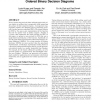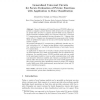546 search results - page 12 / 110 » On the Power of Secure Two-Party Computation |
CCS
2006
ACM
15 years 3 months ago
2006
ACM
Privacy-preserving protocols allow multiple parties with private inputs to perform joint computation while preserving the privacy of their respective inputs. An important cryptogr...
PKC
2007
Springer
15 years 5 months ago
2007
Springer
Abstract. Yao’s classical millionaires’ problem is about securely determining whether x > y, given two input values x, y, which are held as private inputs by two parties, re...
121
click to vote
TCOS
2010
14 years 6 months ago
2010
With the increasing wealth of digital information stored on computer systems today, security issues have become increasingly important. In addition to attacks targeting the softwar...
106
click to vote
IPPS
2005
IEEE
15 years 4 months ago
2005
IEEE
1 Electronic fair-exchange protocols have received significant attention from the research community in the recent past. In loose terms, the fair exchange problem is defined as at...
ICISC
2008
15 years 20 days ago
2008
Secure Evaluation of Private Functions (PF-SFE) allows two parties to compute a private function which is known by one party only on private data of both. It is known that PF-SFE c...


